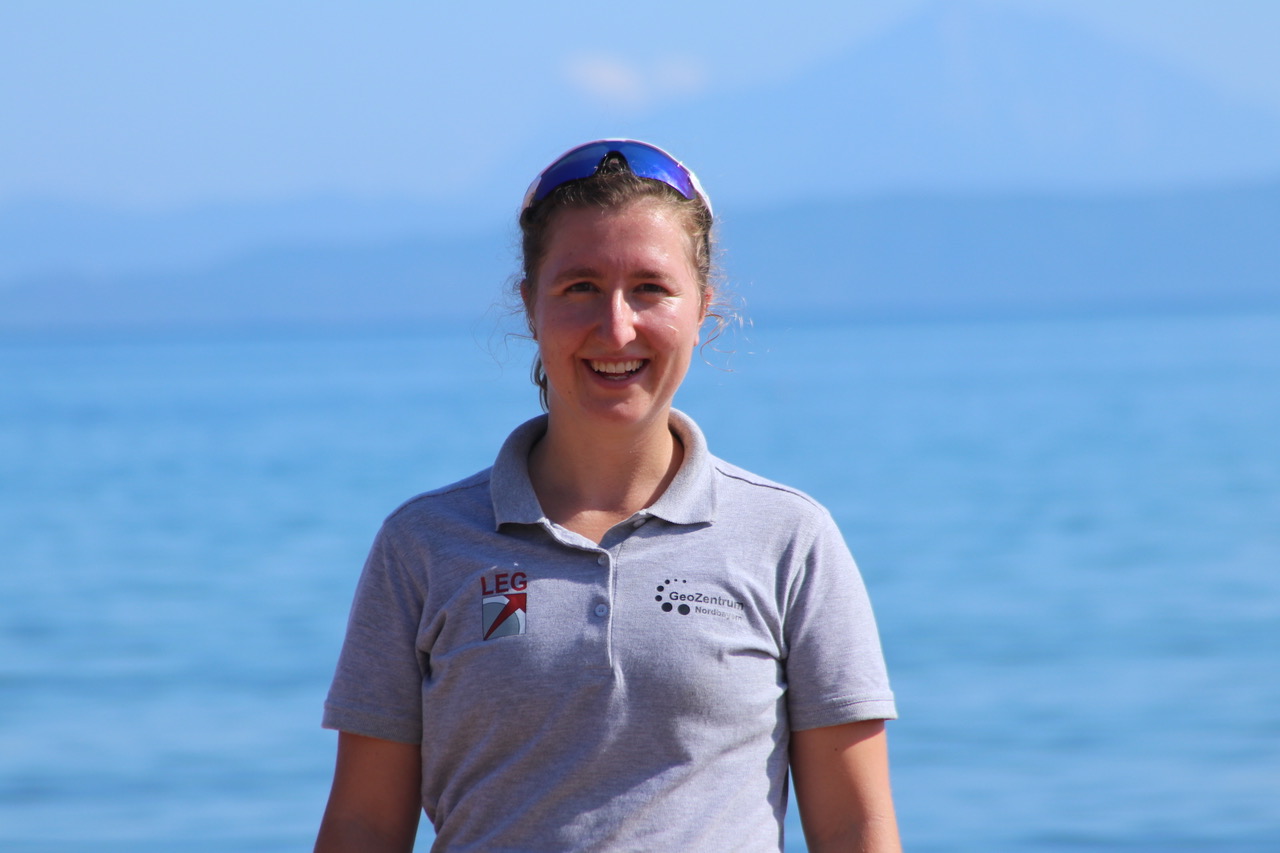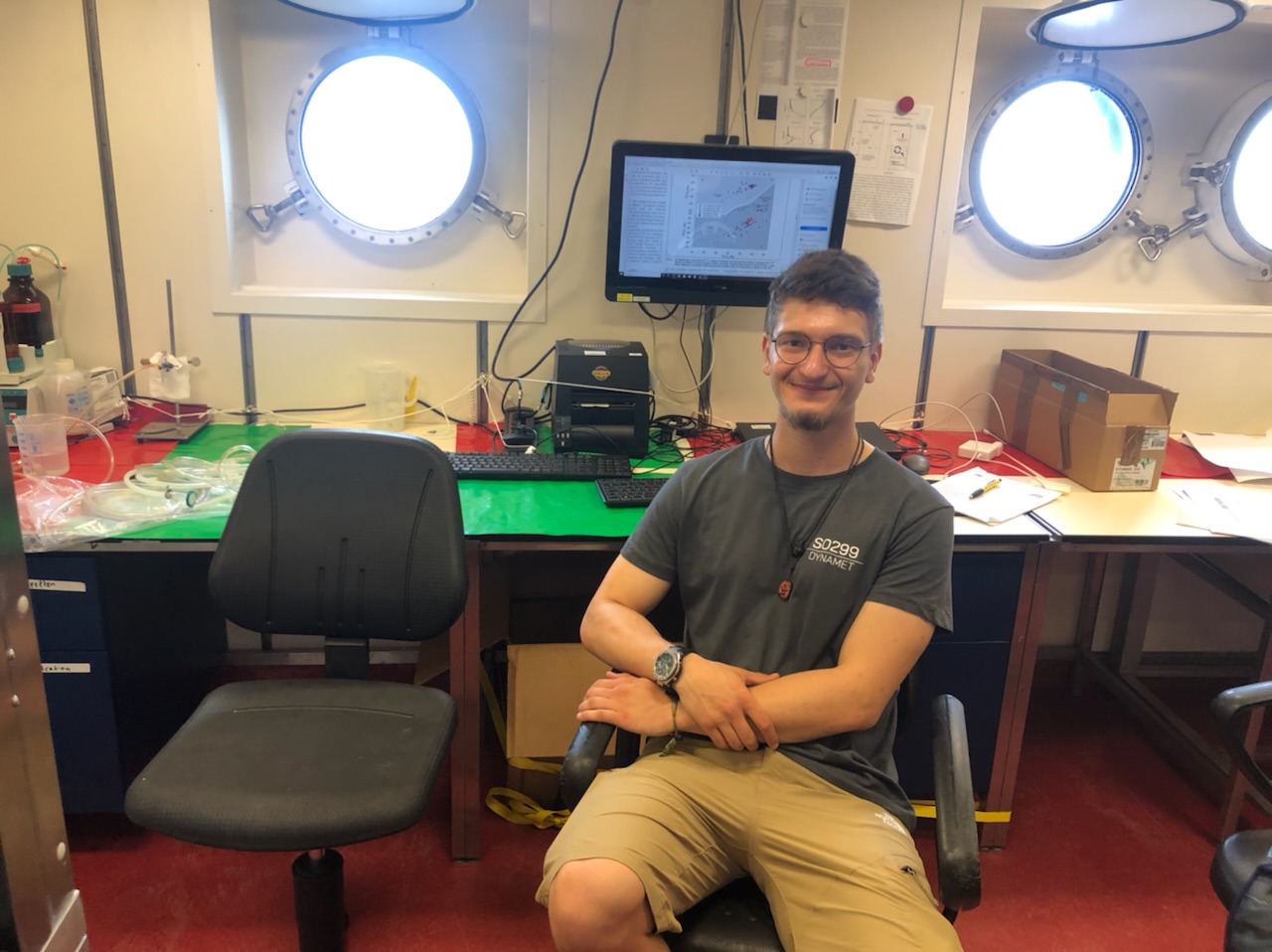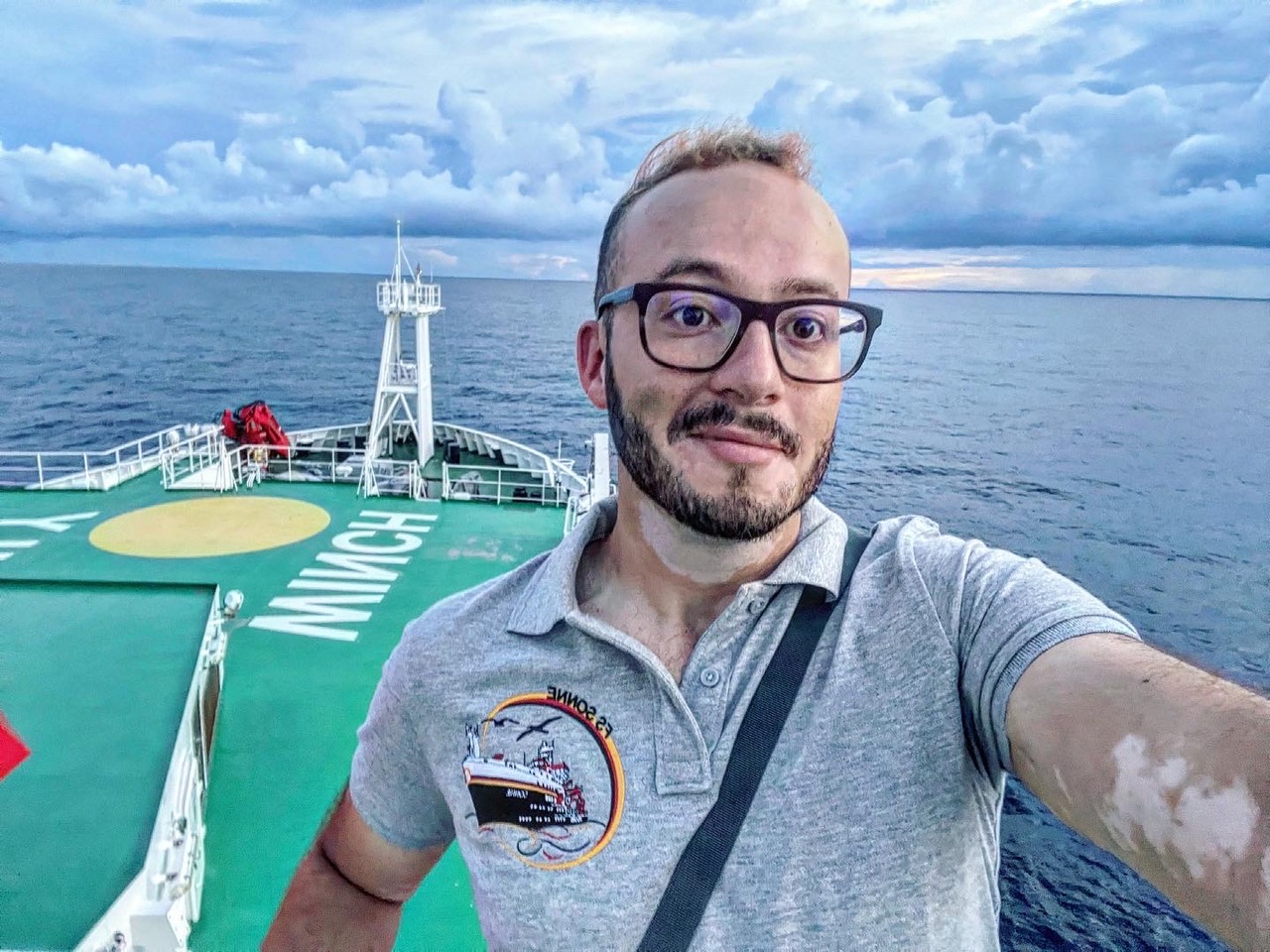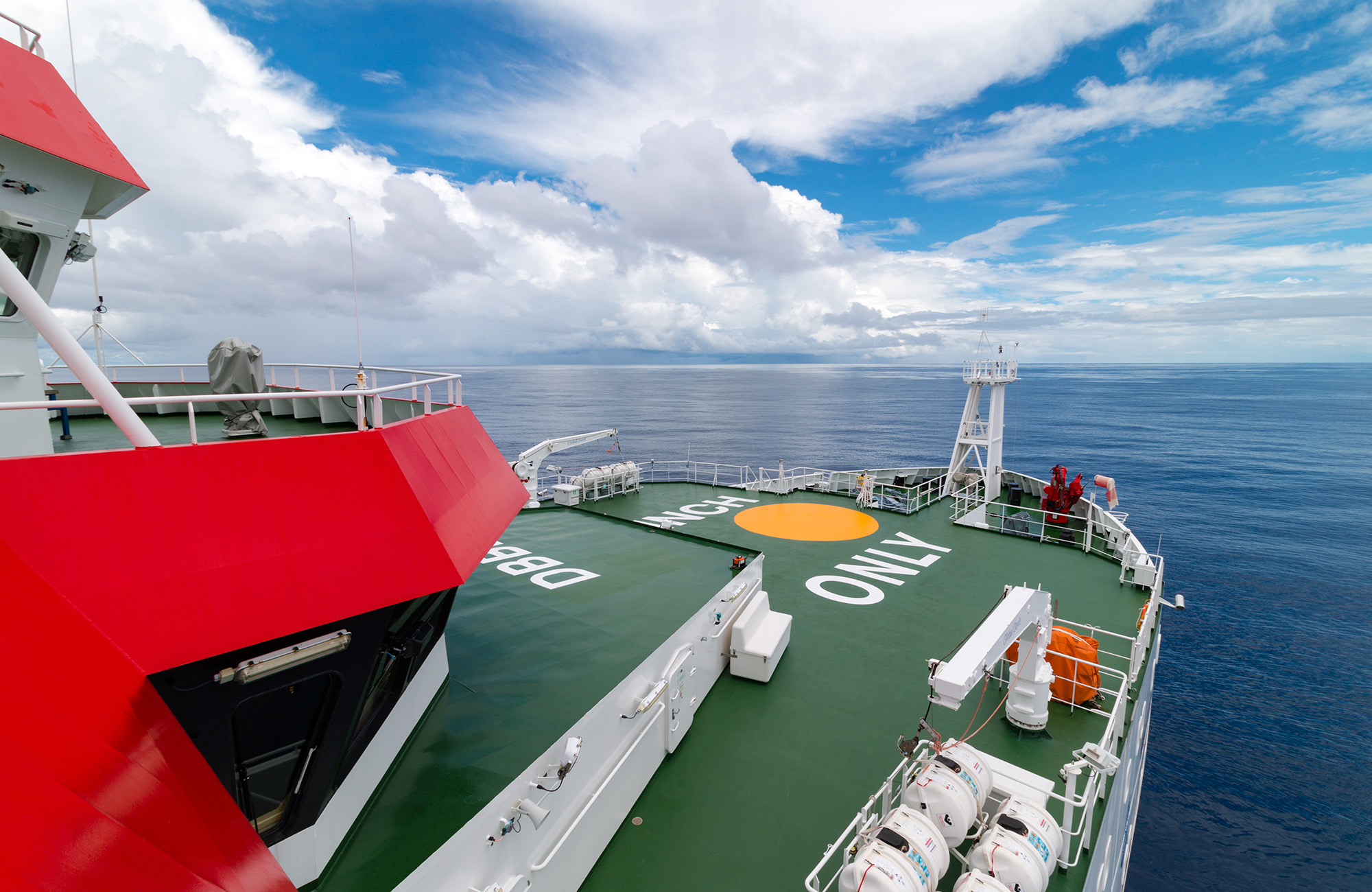The research vessel SONNE left Townsville on 6. June 2023 in the evening and is currently on its way to the working area with a diverse research team on board. For some of our young scientists, it is the very first research expedition at sea. Who are they? What are they working on? How did they end up on a research vessel so far away from home and what are their first feelings about this unique experience? We asked them to introduce themselves and share their impression.

Servus guys, I am Julia, 24, a master student of Geosciences from the Friedrich-Alexander-Universität (FAU) Erlangen-Nürnberg in Germany and I am currently working as a student assistant at our institute, the GeoZentrum Nordbayern. About one year ago after an internship at Christoph Beier’s lab in Helsinki, I was kindly asked to participate in this research cruise – aiming to conceive my master thesis about the outcome.
Together with Egor and some colleagues, we are responsible for the petrology and geochemistry of hard rock samples. Therefore, we are really looking forward to get as much material as possible directly from the ocean’s floor.
The first days here were less about hard lab work but nevertheless challenging in this completely new environment. Learning the names of all these nice new people, getting lost in the maze of corridors and floors, trying to follow all rules and the behavior on board particularly in terms of safety.
But it could be worse with an excellent kitchen four times a day and a clear starry sky in the middle of nowhere. I have even seen a shooting star but I won’t let you guys know about my wish 😉. Eventually, I want to emphasize that I am really excited to seize this opportunity and to experience such a unique expedition still during my studies at the end or beginning of the world.

My name is William, I’m studying the BSc. Geosciences at Kiel University in Germany and working at GEOMAR as a student assistant in the research division 2: marine biogeochemistry.
My main task on bord will be to take samples for gas analytics, especially methane. Therefore, pore water, sea water as well as sediment samples have to be taken so the dissolved gases can later be analyzed at GEOMAR using various methods.
But since there are so many different research topics on this cruise, I also have the opportunity to take a closer look on these, gain more experience and help out wherever I’m needed, for instance in the rock lab or the hydroacoustics.
Being part of this team full of experienced scientists and working on the other side of the world, in an unfamiliar environment is such a great experience and I believe I will soon get used to the life on board this research vessel. For example, it’s quite unusual for me to eat at the exact same time every day, but the above-average variety of delicious food makes this easier.
The thought of exploring this lesser-known area of the world mixes with the feeling of excitement I have at the beginning of my first cruise.
Overall, I believe SO299 will be an unforgettable adventure.

Hello dear readers, I’m Hannah, a bachelor student of geophysics at the University of Münster in Germany. SO299 is my first cruise on a research vessel and I am part of the OBMT team. OBMTs (= Ocean Bottom Magnetotelluric) are electromagnetic instruments that use the Earth’s natural magnetic field to study the geological properties of the subsurface beneath the ocean floor. Through an internship in the EM group at GEOMAR in Kiel, I got the opportunity to participate in this research cruise.
Working on a research vessel is a very special experience for me. You get a lot of practical experience, especially in handling the marine instruments. It’s a great experience and a great opportunity to learn a lot!
Everyone on board is working as a team, including the scientists and the crew. It is an open and friendly environment with mutual help and support I am looking forward to an exciting and enjoyable time.
Hello! My Name is Egor Riemer. I’m originally from a smaller town called Ansbach but moved a while ago to study geosciences at the FAU Erlangen-Nürnberg, Germany like Julia. Throughout my undergraduate studies I quickly realized that most of my interests lie in petrology and associated sulfide mineralogy which I was able to combine in my bachelor thesis through working on VMS deposits, with special focus on the assumed chemical link between black smoker fluids and deposited chalcopyrite. From that point on and especially during my master’s studies I started to really enjoy the geochemical aspect of petrology. Currently, I am concluding my studies with my work on the porphyry copper deposit SarCheshmeh in Iran.
But how did I end up on SO299? About one year ago Prof. Dr. Karsten Haase (FAU) came up to me, explained that his working group is planning to invite students to go on a scientific cruise and simply asked me if I wanted to join. In the beginning I was hesitant to agree because of the long duration of the cruise but accepted the invitation shortly after. About 6 months ago when most of the logistics like packaging the needed equipment and booking our flight began, I also started to get a grasp of what the work of a petrologist on a research vessel consists of: hammering or sawing rocks into smaller pieces, sorting them and further describing, classifying, naming and packaging them for future research. And although I am probably not going to work on the samples that I am preparing, I still really appreciate the opportunity to be one of the first people to ever see and touch rocks from the great depths of one of the most interesting tectonically active and Au depositing areas on Earth.
(The koalas, kangaroos, wombats, crocodiles and birds I got to see in Townsville’s animal sanctuary prior to our departure were pretty cool as well 😉

My name is Octavio Acuña-Avendaño, I am a geologist and a PhD student in Earth Sciences at the University of Toronto. I am originally from Costa Rica. I did my bachelor’s degree in geology at the University of Costa Rica, worked for several years in high enthalpy geothermal energy and studied a MSc in renewable energies at the University of Barcelona.
This is my first experience on a research vessel. I am part of the SO-299 thanks to iMAGE-CREATE, a partnership of 5 Canadian universities with the support of the Natural Sciences and Engineering Research Council of Canada (NSERC). iMAGE-CREATE is also a collaboration with the GEOMAR Helmholtz Centre for Ocean Research Kiel, and other German institutions.
As a CREATE student I have been working on topics related to subduction zone geodynamics and georesources. My work area is the southeastern section of the Philippine Sea Plate, specifically the Parece Vela Basin and Mariana Subduction Zone. During this research cruise I will be working in the Hydroacoustic Laboratory. I will work on the collection and processing of real time bathymetry and help identify the main morphological and geological features of the seafloor.
In my particular case, I think this is an invaluable experience. As a geoscientist in training, coming from Latin America, I feel extremely fortunate to be part of this crew. It is an outstanding opportunity to learn in real time about work at sea and learn firsthand from world- leading experts. On the other hand, I never imagined traveling to such far away destinations and traversing the ocean.
I had to travel for more than 44 hours and several airports to get from Costa Rica to Australia, and that alone was an amazing trip. I spent a couple of days in Australia getting to know the exotic wildlife, trying new dishes, and making new friends. Now it only remains to wait what new experiences I will be able to live during the next 2 months at sea.
Early impressions are quite encouraging. Everyone here is really friendly; they all have a lot to share and they all make you feel welcome. I hope to make many new friends. The ship itself is very large and modern. The rooms are spacious and equipped with everything you might need. The food is great, I feel like I’m in a fancy German hotel every time it’s time to eat. It is true that this is my first time trying German food but so far, I love it. And there’s even a gym to burn off all those calories from the delicious food.
With little else to say so far, I can only feel grateful to be here and excited for what will happen in the coming weeks.
Can’t wait!

Congratulations from Costa Rica, many successes in your investigations.